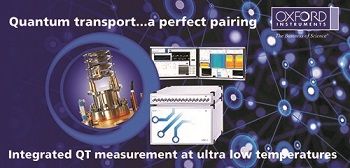This agreement places Oxford in a very nice position.
Quantum transport measurements are widely used in characterising new materials and devices for emerging quantum technology applications such as quantum information processing (QIP), quantum computing (QC) and quantum sensors. Such devices hold the potential to revolutionise future technology in high performance computing and sensing in the same way that semiconductors and the transistor did over half a century ago.
Physicists have long used standard electrical transport measurements such as resistivity, conductance and the Hall effect to gain information on the electronic properties and structure of materials. Now quantum transport measurements such as the quantum Hall effect (QHE) and fractional quantum Hall effect (FQHE) in two-dimensional electron gases (2DEG) and topological insulators – along with a range of other more complex measurements – inform researchers on material properties with quantum mechanical effects.
The ultra low temperatures and high magnetic fields provided by Oxford Instruments’ TritonTM dilution refrigerator make it a key research tool in revealing the quantum properties of many materials of interest. SPECS’ Nanonis Tramea QTMS is a natural complementary partner to the Triton, with its fast, multi-channel measurements.
